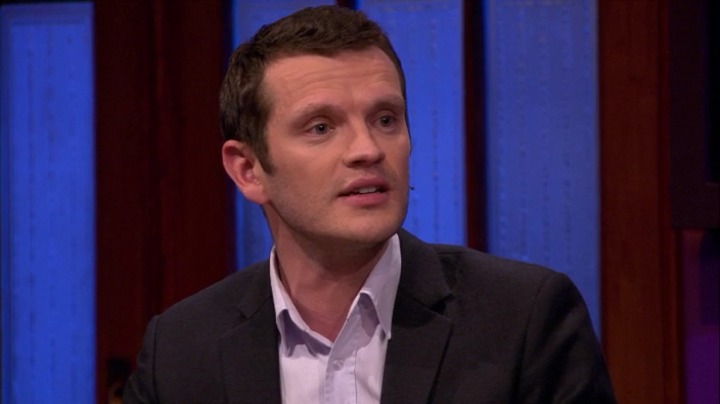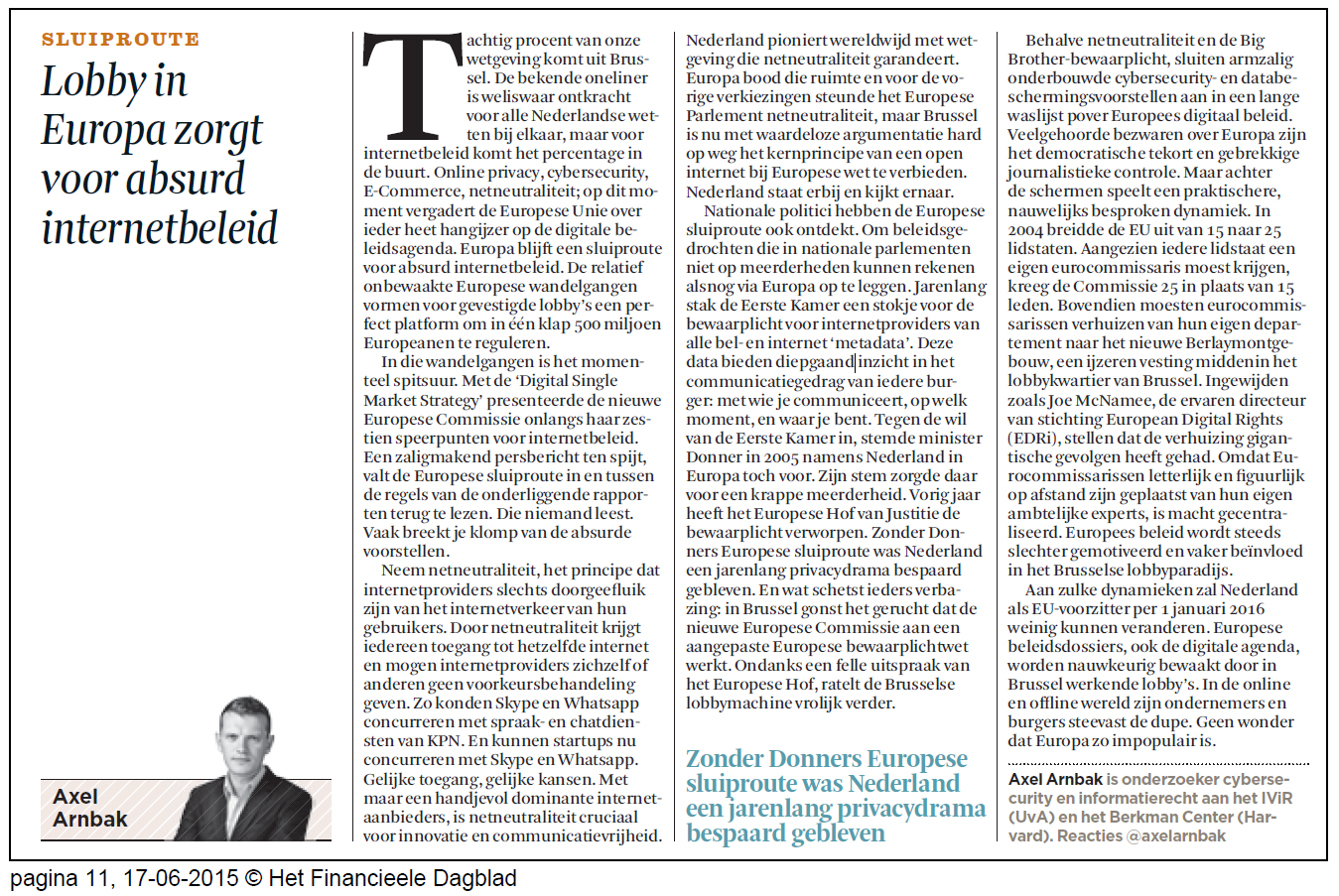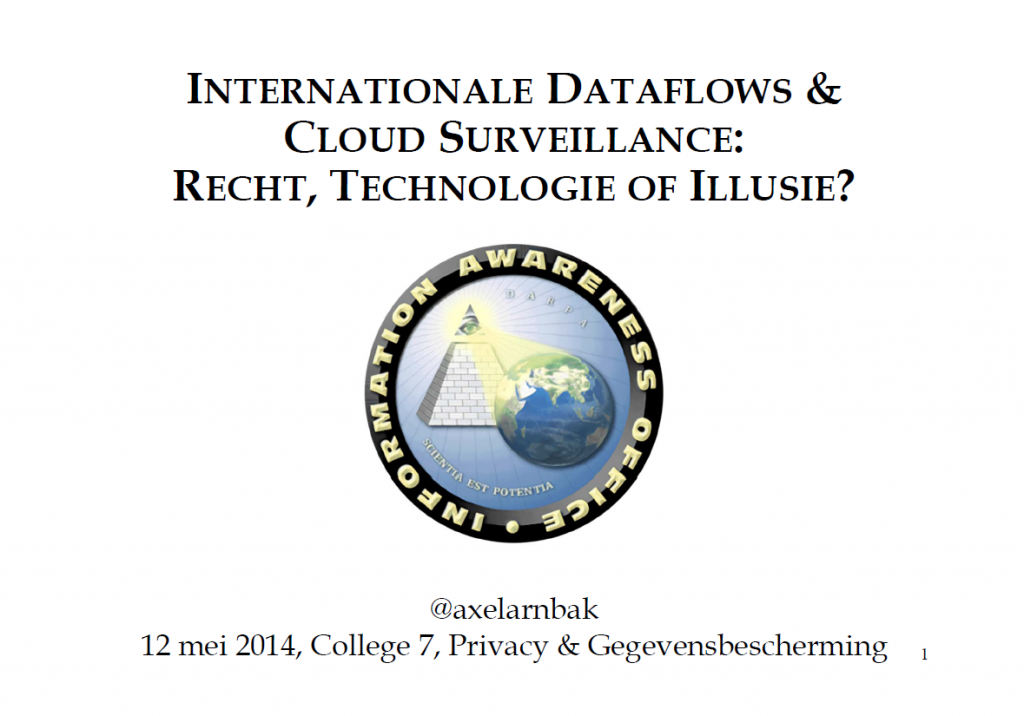Klik op het plaatje om het hele stuk te lezen. Mijn eerdere FD columns zijn ook hier op m’n blog terug te lezen.
Tag Archives: EU
RTL Late Night: Talkshowbabbels over Facebook en Privacyboetes

Bij RTL Late Night om te babbelen over nieuwe privacy-onderzoeken van de Nederlandse toezichthouder CBP naar Facebook’s en Google’s praktijken. Kijken hierrr.
Expert Panel Report: A New Governance Model for Communications Security?
Published 5 December 2014 on Freedom to Tinker.
Today, the vulnerable state of electronic communications security dominates headlines across the globe, while surveillance, money and power increasingly permeate the ‘cybersecurity’ policy arena. With the stakes so high, how should communications security be regulated? Deirdre Mulligan (UC Berkeley), Ashkan Soltani (independent, Washington Post), Ian Brown (Oxford) and Michel van Eeten (TU Delft) weighed in on this proposition at an expert panel on my doctoral project at the Amsterdam Information Influx conference. Continue reading Expert Panel Report: A New Governance Model for Communications Security?
Opinie FD en Lezing Eerste Kamer: ‘Nederland als Internetdokter tussen Cybergrootmachten’
Op 6 mei mocht ik een bijdrage leveren aan de expertsessie ‘Cyberintelligence en Publiek Belang’ in de Eerste Kamer. Het ontwikkelen van inzicht in de Snowden-onthullingen stond daarin centraal. Het Financieel Dagblad publiceerde gisteren een bewerking van mijn lezing op de Opiniepagina. Klik op het plaatje hieronder om het stuk te lezen, waarin ik probeer in te gaan op welke rol voor Nederland is weggelegd nu we ons geconfronteerd zien met genetwerkte communicatie-omgeving van totale surveillance. De opinie is voor een breed publiek en daarom wat simpeler. De volledige tekst van mijn langere lezing heb ik daaronder integraal opgenomen. De lezing is wat anders van toon, want gericht aan senatoren, en bevat meer technische en juridische lagen.
UPDATE: Mede op basis van mijn lezing, heeft de Eerste Kamer een aantal moties aangenomen over privacy en security na Snowden.
Slides Hoorcollege over Snowden-onthullingen: ‘Internationale Dataflows & Cloud Surveillance’
Net twee uur college gegeven bij het vak ‘privacy & gegevensbescherming’ aan masterstudenten infomatierecht van de Universiteit van Amsterdam. Het college geeft een overzicht van een paar belangrijke onthullingen rondom de praktijk van intelligence surveillance, plaatst ze in politiek-historisch perspectief en gaat wat dieper in op de beweegredenen van inlichtingendiensten ‘to know it all’. Na de pauze bespreek ik welke oplossingsrichtingen recht, beleid en technologie bieden. Ook een aantal nieuwe onthullingen in het gisteren gepubliceerde boek van Greenwald komen aan bod. Klik op de openingsslide hieronder om alle 100+ slides te zien (geen zorgen, veel plaatjes).
Any Colour You Like: the History (and Future?) of Internet Security Policy [talk]
Yesterday, I did a first in a series of talks on over four decades of internet security policies. A tedious piece of research, that I don’t think anyone has done before. It’s a cornerstone of my thesis, and I’m currently finishing a draft chapter/paper on the topic under the same title – borrowing names from Pink Floyd seems to become a tradition of sorts.
So here’s my slides for the 27 March Cyberscholars Working Group at Harvard’s Berkman Center [pdf]. The talk was aimed to be 15 minutes long for a small and general audience, so obviously it’s a bit shallow. Questions, feedback, all more than welcome! I hope to get the paper out by the end of April. The abstract: Continue reading Any Colour You Like: the History (and Future?) of Internet Security Policy [talk]
Translation Dutch Net Freedom Laws 2011: Net Neutrality, No Commercial Wiretapping, No 3 Strikes
If there’s one thing U.S. researchers know about the state of the web in The Netherlands, it’s that those Lower Countries got their act together when net neutrality became law in 2012. Hell, even the New York Times ran a story, as it was the first net neutrality law in Europe, the second in the world after Chile. These days, net neutrality is the talk of the town both in the U.S. and the E.U., but it seems further away than ever: the U.S. Senate has scheduled a hearing about the Comcast/Time Warner Cable merger, creating a telco giant with huge power of internet access provision. And at the E.U. level, the issue is up for vote in the Pariament – and it doesn’t look too good. The key provisions from the Dutch internet freedom legislative package may provide some inspiration in times of desperation. They cover net neutrality, a prohibition on commercial wiretapping (DPI), and one on three strikes copyright enforcement. Continue reading Translation Dutch Net Freedom Laws 2011: Net Neutrality, No Commercial Wiretapping, No 3 Strikes
ECHR Fast-tracks Court Case on PRISM and TEMPORA (and VERYANGRYBIRDS?)
So. The NSA and GCHQ piggyback on Angry Birds to spy on its 1.7 billion users. potential terrorists. Not only that, but everything on smartphones can be compromised: “if its on the phone, we can get it”. Will it ever stop? A few days ago, the European Court of Human Rights (‘ECHR’) made the unique move to fast-track a case on the legality of mass surveillance practices by the GCHQ. A judgement is now expected in months, rather than years – in time to have a huge impact on the global debate on mass surveillance. Time for some analysis. Continue reading ECHR Fast-tracks Court Case on PRISM and TEMPORA (and VERYANGRYBIRDS?)
Continue reading ECHR Fast-tracks Court Case on PRISM and TEMPORA (and VERYANGRYBIRDS?)
Paper Repository on the NSA Revelations – Add Yours in the Comments [UPDATE]
Recently, I’ve been circulating a reading list of papers and reports on the NSA revelations on a couple of mailing lists. The writings take a step back from the nitty gritty details, and focus on the more fundamental issues that technical, legal and political responses need to address. People have been asking me to blog about it, so here’s a stub, and I encourage you all to add your suggestions in the comments. [UPDATE 25.02.14: added extra sources on securitization]  Continue reading Paper Repository on the NSA Revelations – Add Yours in the Comments [UPDATE]
Continue reading Paper Repository on the NSA Revelations – Add Yours in the Comments [UPDATE]
The Politics of the EU Court Data Retention Opinion: End to Mass Surveillance?
Published 13 Dec. 2013 at Freedom to Tinker.
The Wall Street Journal headlines: “EU Court Opinion: Data Retention Directive Incompatible With Fundamental Rights”. The Opinion is strong, but in fact not yet an outright victory to privacy and civil liberties. The jury is out: the Opinion is a non-binding, but influential advice to the E.U. Court, that will deliver its final judgment come next spring. Now is a perfect moment to analyze the Opinion, as well as the institutional politics of the E.U. Court — critical in understanding the two-tier approach to surveillance and fundamental rights in Europe. The two-tier approach converges, after 60 years, when the E.U. accedes to the European Convention of Human Rights anytime soon. Amidst the Snowden revelations, these are the fundamental legal developments that will ultimately answer the question whether European law can end mass surveillance. Continue reading The Politics of the EU Court Data Retention Opinion: End to Mass Surveillance?
Data Retention: Figurehead of Our Liberation?
Back in 2010, I wrote a long piece in Dutch for De Groene Amsterdammer about the deplorable state of the controversial EU Data Retention Directive evaluation. My point was that, instead of the prime example of our loss of fundamental rights, data retention might one day become the case in point of digital freedom vindicating over surveillance, once the Directive in one way or another is repealed or its inherent privacy violations seriously limited. Continue reading Data Retention: Figurehead of Our Liberation?
Data Retention Directive evaluation: expect the unexpected?
This piece was posted on the Bits of Freedom blog on 8 December 2010. I still think it is a quite accurate and informative take on the Data Retention Directive evaluation.
The evaluation of the controversial Data Retention Directive takes an unexpected turn, for the worse. At a crucial one-day conference in Brussels, aimed at gathering input for the evaluation, long-term critic of the Directive Commissioner Malmström (Home Affairs) surprisingly announced that ‘data retention is here to stay’. The statement not only disregards legal developments since 2005, the damage done by telecommunications data retention to 500 million Europeans and lack of evidence that such a measure is necessary and proportionate. On top of that, the Commissioner undermines the entire evaluation process and evidence-based decision making itself. To great risk, because our fundamental freedoms and the very nature of our free and open societies are at stake. Continue reading Data Retention Directive evaluation: expect the unexpected?

